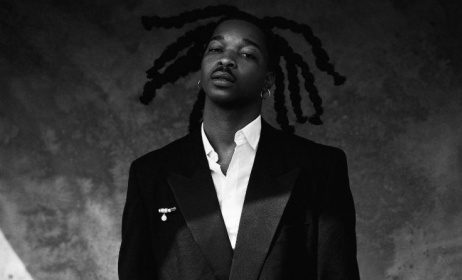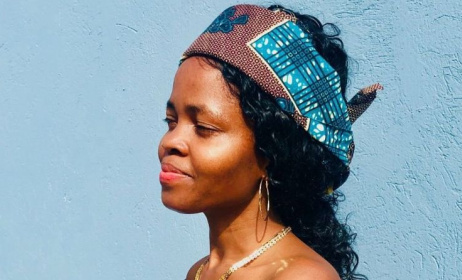Phiona Okumu opens up about Spotify’s West Africa strategy
Despite Ghana and Nigeria constituting key African music markets, the two West African countries have waited more than three years since Spotify first arrived on the continent to get the service.
 Spotify head of music for sub-Saharan Africa Phiona Okumu.
Spotify head of music for sub-Saharan Africa Phiona Okumu.
But contrary to the popular notion that the Swedish streaming service took too long to get here, Spotify’s head of music for sub-Saharan Africa, Phiona Okumu, maintains that her company has arrived at the right time.
“Launching on a continent as diverse as this one – the amount of countries, the number of languages, the amount of culture that we have – I don’t think it would be right for us to rush into a situation,” she told the Accra-based Citi FM after Spotify expanded into more than 30 African countries recently. “When we land in a space, we want to be sure that we land correctly and that means doing all the right things – the due diligence. It means making sure that we are doing everything legally. It means that we are signing the right contracts with the label partners and all other legal considerations.
Launching also required “making sure we have the right team in place, making sure there is a good fit of a localised team that understands how to tell the story internally or within the country and also to the rest of the world. Those were the things that make it seem that we are late to the party but actually I believe we are right on time.”
Spotify’s launch in West Africa forms part of the company’s a strategic expansion into more than 80 new countries across Asia, the Caribbean, Europe, Latin America and Africa. Okumu, who acknowledged Ghana’s rich music history and contribution to the global music scene, noted that the signs were already promising. Since first going live in 2008, Spotify has paid out about €21bn ($25bn) in royalties to rights owners, which Okumu believes is a demonstration of the company’s commitment to compensating creators fairly, as per negotiations with labels and artists, and ensuring an ecosystem favourable for all stakeholders.
“We always make sure those negotiations are fair but we absolutely prioritise where the labels are coming from, where the artists are coming from and that’s how we do it. We make sure that whatever income that is coming in, it’s a pool that is shared in the ecosystem.”
For Okumu, it behoves all players to prioritise the education of the creative community to gain an understanding in trade details including copyright and publishing. In line with this, Spotify is in the process of rolling out programmes targeting songwriter relations in the middle of 2021.
She also noted that piracy is a major threat to artists’ compensation. The menace, which is prevalent on the continent, can be pinned down to many African consumers not valuing their music. This notwithstanding, Okumu believes that times are changing and “we are starting to really see music as one of the most important exports for us and also something we can’t live without, so why would we not want to give it the monetary value that it deserves?”
On how to curb piracy in the subregion, Okumu said: “Education is definitely the only way and who you know and who we rely on to drive this message home to the artist community.” Within South Africa’s amapiano space, for instance, Spotify has begun engaging artists, whom the company believes are thought leaders, to direct listener to legitimate digital service providers to help clamp down on the problem. Positive results are beginning to show and streaming numbers for amapiano artists are witnessing unprecedented growth. “I am very hopeful that we can make this work [in Ghana],” Okumu said. “We are going to be focusing on a lot of education for the community that we are working with as well as the different rights collecting societies, whether it’s GHAMRO [Ghana Music Rights Organisation] or IFPI [International Federation of the Phonographic Industry].”
On high data costs in Africa compared to other parts of the world, Okumu cited Spotify Lite, a less data-intensive option that she expects will take off in Ghana and neighbouring markets. Additionally, Spotify will partner with local telcos throughout its journey in Africa to design suitable solutions.
“We are here to learn as much as we are to teach and we are here to grow with the community that is going to grow with us and we are looking forward to partnerships on every level, whether it is an artist to Spotify, a brand to Spotify, or media. We need everybody to make this thing grow.”
Okumu said her outfit remained keen on its goal to be the best audio company globally, which, in light of recent trends, implies special attention to podcasts. “We are engaging with all the creators whether they be artists or podcast creators. We are going to be prioritising podcasts. There is no secret that there is a big boom in this area and we are excited to be a part of this conversation. And I will pretty much say we are market leaders in terms of being the leading audio experience in terms of streaming, so certainly there is going to be a heavy focus on podcasting in due time.”
Aside from being the biggest, Spotify is working on being the best, Okumu said. “What that means, for example, we have the most intuitive platform that there is and I can test that against any other platform right now. We have a saying at Spotify which goes, ‘We have 345 million versions of Spotify’. What that means is that every active user on Spotify uses it differently. Spotify will listen to what you like and customise the experience so specifically that at the end of the day you and your sister who are both listening to Spotify are probably not listening to the same thing. And that is what makes us such an incredible platform.
Okumu noted that Spotify’s reliance on both an editorial team and AI will advance user experience. “That’s how we are going to win the game.”
According to 2015 statistics by the United Nations, Africa is home to 226 million people aged 15 to 24, representing nearly 20% of Africa’s population and one-fifth of the world’s population of young people. For Okumu, this is significant. “With that already we are in the right space and that’s automatic across the board for any streaming platform. But over and above that, we are going to have a much more diversified landscape.
“The user that is in Africa is going to discover more African music and more international music. That already for me is a win because music is borderless and that is a much more intuitive way and the way young people, especially, listen to music. They don’t really care, or even if they do, it’s not much of a deal-breaker that the music must only be from here. It’s about how personal it feels to them. If it’s Burna Boy today and Travis Scott tomorrow, it’s all a seamless experience and I believe that is one of the ways we are going to do it.
Finally, local acts will have a better and fairer chance at international discovery. “What we are doing here is the same thing that the listener in Brazil or the US or Mexico is doing – they are discovering music. Discovery is the thing that has been the fuel for our engine from the beginning and that is going to continue to help us create the most personalised experience. It’s going to help people cross borders ... So I’m hoping to see much bigger business, bigger audiences, a more nuanced audience and much more personalised experiences,” Okumu said.



































Comments
Log in or register to post comments